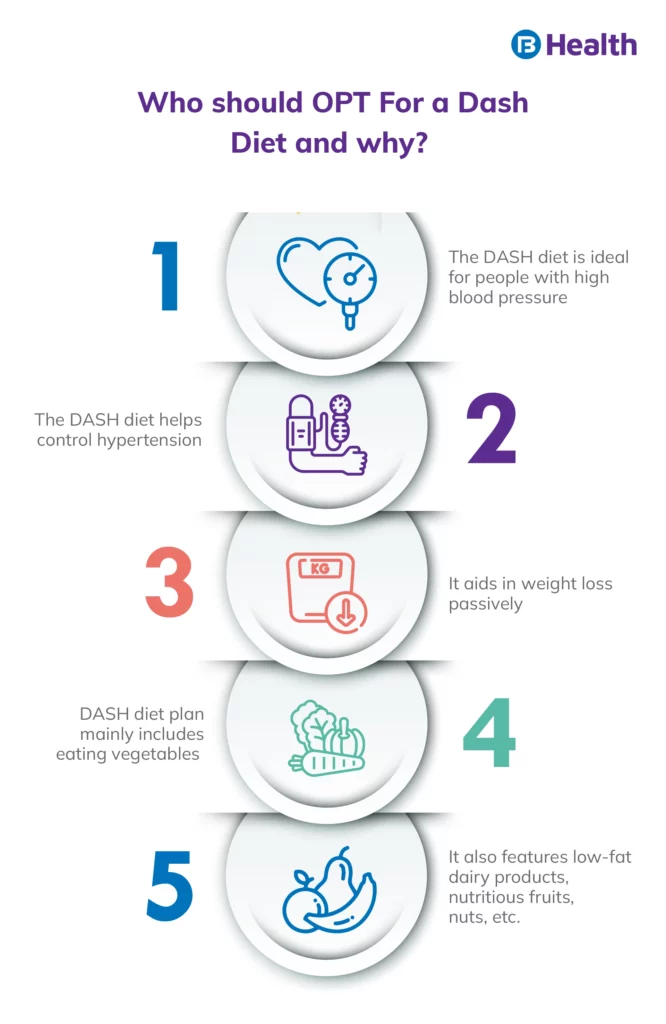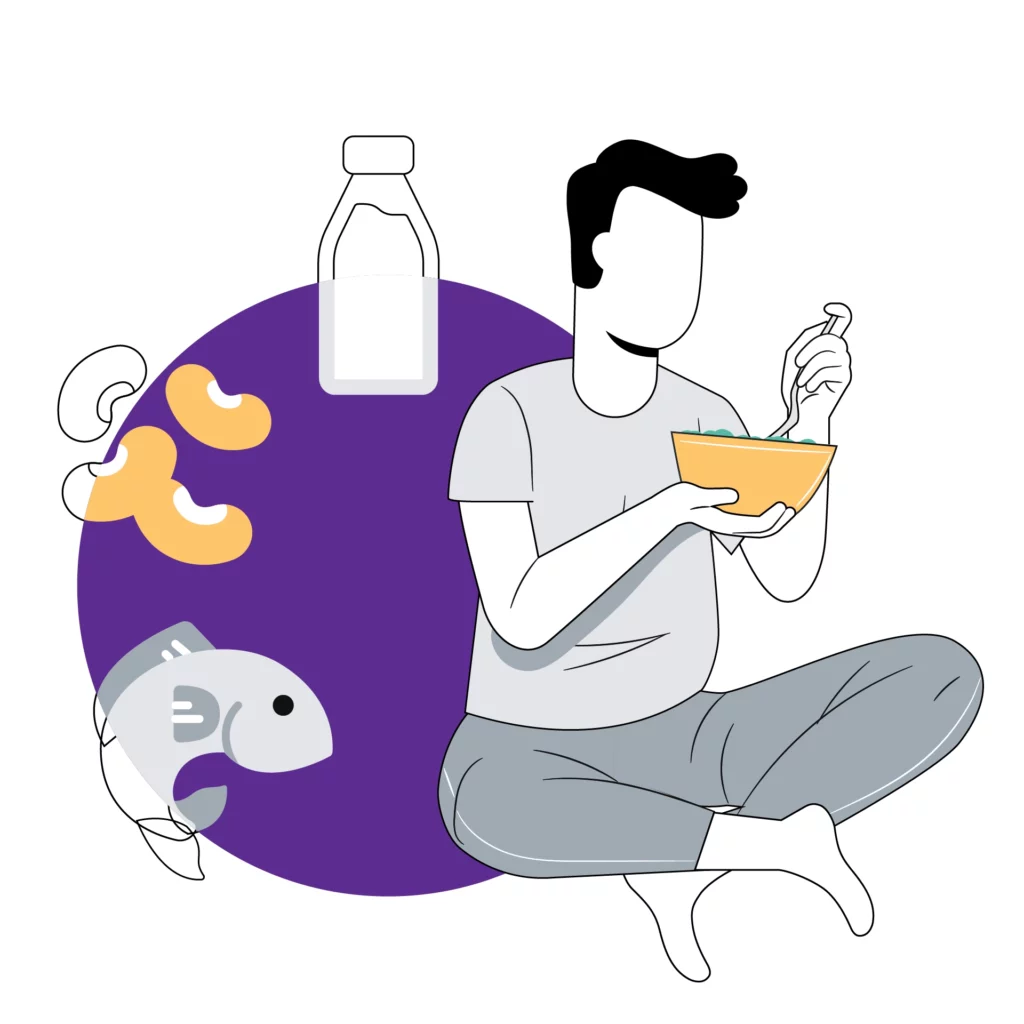General Health | 8 min read
What Is A Dash Diet, Who Should Follow It And Who Shouldn’t
Medically reviewed by
Table of Content
Synopsis
The DASH diet is a diet plan with lowered salt intake. It can be efficient for people with high blood pressure and hypertension who want to lose weight. Keep reading this blog to learn more interesting facts about the DASH diet.
Key Takeaways
- A DASH diet is similar to a normal diet for weight loss
- It is most beneficial for people with high blood pressure or hypertension
- DASH, or Dietary Approaches to Stop Hypertension, help reduce blood pressure
Scientists have developed specialized dietary methods to assist lower blood pressure because nutrition plays an important part in developing high blood pressure. The DASH diet, which has been created to help people manage their high blood pressure and lower their risk of developing heart disease, is discussed in this article.
Tips to Increase the Effectiveness of the DASH Diet
- Include a veggie serving for lunch and dinner
- Include fruit in your meal or in snacking
- Use dried and canned fruits, but make sure there isn't any sugar added
- Use half as much margarine, butter, or salad dressing as usual, and choose fat-free or low-fat condiments
- Drink dairy products with less fat or skimmed
- Limit your daily meat intake to 6 ounces
- Increase your intake of dry beans and veggies
- Instead of chips or sweets, snack on unsalted pretzels or almonds, raisins, fat-free and low-fat yogurt, unsalted, plain popcorn without butter, frozen yogurt, and raw veggies
- Check the food labels to find products with reduced sodium levels
What Is the DASH Diet?
People who want to prevent or manage hypertension, often known as high blood pressure, and lower their risk of heart disease are advised to follow the DASH diet, which stands for Dietary Approaches to Stop Hypertension.
Lean meats, fruits, and vegetables are the main components of DASH diet recipes. The diet was developed in response to research showing that people who ate plant-based diets, such as vegetarians and vegans, had much lower rates of high blood pressure.
Because of this, the DASH diet prioritizes vegetables and fruits while also including certain lean protein sources, such as chicken, fish, and legumes. Red meat, salts, added sugars, and fat are all limited in the diet.
According to scientists, one of the primary reasons this diet can help those with high blood pressure is because it lowers salt intake. The standard DASH diet meal plan recommends consuming no more sodium than one teaspoon (2,300 mg) per day, which is in accordance with the majority of national recommendations. The version with less salt advises consuming no more sodium than 1,500 mg per day, or 3/4 teaspoon.

Benefits of The DASH Diet
The DASH diet has a lot of potential advantages beyond lowering blood pressure, such as weight loss and a lower chance of developing cancer. DASH wasn't made primarily to aid in weight loss; therefore, you shouldn't anticipate it to do so on its own. Perhaps losing weight is just an extra benefit. The diet has a variety of effects on your body.
Reduces Blood Pressure
Blood pressure measures the pressure exerted on your organs and blood vessels as they transport blood throughout your body. It is divided into two digits:
- Systolic pressure: The force exerted by your heartbeat on your blood vessels
- Diastolic pressure: Your diastolic pressure is the pressure in the blood vessels between beats
Adults with normal blood pressure have systolic pressures less than 120 mm Hg and diastolic pressures less than 80 mmHg. The normal formatting for it would look like this: 120/80, with the systolic BP being higher than the diastolic. High blood pressure is defined as a measurement of 140/90 or higher.
Both People with high blood pressure and those who are healthy have decreased blood pressure after following the DASH diet. In trials, those following the DASH diet had reduced blood pressure, even if they didn't lose weight or cut back on salt. However, the DASH diet further reduced blood pressure when salt intake was restricted. Those who consumed the least salt experienced the biggest drops in blood pressure.
Helps With Weight Loss
You'll have decreased blood pressure regardless of whether you lose weight while following the DASH diet. However, you have likely received advice to decrease weight if you have high blood pressure. This is because your blood pressure generally keeps increasing as you gain weight.
You can utilize a DASH diet for weight loss, as it may help since it is similar to other diet plans for losing weight.
Additional Reads: Balanced Diet Food ListAdditional Health Advantages of DASH Diet
This diet may have an impact on various aspects of health.
- Reduces the risk of cancer: According to a new study, people who follow the DASH diet have a lower chance of developing some cancers, like colorectal and breast cancer
- Reduces the risk of metabolic syndrome: According to some research, the DASH diet can cut your chance of developing metabolic syndrome by as much as 81%
- Lowered risk of diabetes: A reduced probability of type two diabetes has been attributed to the diet. Some studies show that it can also improve insulin resistance [1]
- Reduces the risk of heart disease: In a recent assessment, women who followed a diet similar to the DASH had a 29% less risk of stroke and a 20% reduced risk of heart disease
Who Benefits the Most From the Dash Diet?
Although studies on the DASH diet found that people who consumed the least salt experienced the biggest drops in blood pressure, the advantages of sodium limitation on lifespan and health are not entirely obvious.
Reducing salt intake impacts blood pressure considerably in those with high blood pressure. However, the consequences of cutting back on salt are minimal among those with normal blood pressure. This may be partially explained by the idea that some are more sensitive to the effects of salt on their blood pressure.
Consuming insufficient amounts of salt is linked to health issues like a higher risk of insulin resistance, heart disease, and fluid retention. The DASH diet's low-sodium variant advises people not to consume over 3/4 teaspoons of salt daily.
Even for those with high blood pressure, it's unclear whether lowering salt consumption to this extent has any advantages. Even though reducing salt intake led to a slight decrease in blood pressure, a recent analysis showed no association between salt consumption and the likelihood of mortality from heart disease.[2]
Additional Read: Keto Diet
What Does the Dash Diet Look Like
No particular foods are recommended on the DASH diet food list. Instead, it suggests a certain number of servings from each food category. You can eat a certain amount of servings depending on the number of calories you consume.
A 2,000-calorie diet is used as the basis for the food portions shown below.
- Wholesome grains 6 to 8 servings each day: Brown rice, Bulgar, quinoa, oatmeal, whole-wheat or whole-grain bread are a few examples of whole grains
- 4-5 servings of vegetables daily: On the DASH diet, all veggies are acceptable
- 4-5 servings of fruits daily: You'll consume a lot of fruits if you use the DASH method. Fruits you can eat include berries, apples, pears, peaches, mango's, and pineapple
- 2-3 servings of dairy products daily: Dairy products must be low in fat while following the DASH diet. Skim milk, low-fat cheese, and yogurt are a few examples
- Six or fewer servings of lean poultry, meat, and fish daily: Choose lean meat cuts, and try to consume a dish of red meat no more frequently than once or twice each week.
- 4-5 servings of nuts, seeds, and legumes weekly: These include kidney beans, split peas, lentils, almonds, peanuts, hazelnuts, walnut, sunflower seeds, flax seeds, etcetera
- 2-3 servings of fats and oils daily: Vegetable oils are preferred to other oils in the DASH diet. Some examples are margarine and oils such as canola, corn, olive, or safflower. Also, it suggests using light salad dressing and low-fat mayo
- Five or fewer servings of Sweets and added sugars weekly: On a DASH diet chart, added sugars are restricted to a minimum, so consume less candy, soda, and table sugar. This diet also limits naturally occurring sugars and other sources of sugar, such as agave nectar
What Makes the Dash Diet Effective?
This diet has no predefined foods; therefore, you can modify your existing diet to suit a diet plan.
- Eat more fruits and veggies
- Consume whole grains
- Select dairy items that are low-fat or fat-free
- Pick lean protein sources, including beans, fish, and poultry
- Use vegetable oils for cooking
- Limit your consumption of sweets and beverages with a lot of added sugar
- Reduce the amount of high-saturated-fat foods you consume, such as fatty meats, full-fat dairy products, and oils like palm and coconut oil
- This diet advises restricting your intake of high-calorie beverages to limited amounts of fresh fruit juice, water, tea, and coffee
Dash Diet For Hypertension
This diet meanings Dietary Approaches to Stop Hypertension. The diet plan is a healthful diet regimen created to treat or prevent high blood pressure or hypertension.
Foods high in calcium, potassium, and magnesium aid blood pressure regulation and are part of the DASH diet. Foods that are heavy in saturated fat, sodium, and added sugars are restricted in this diet.
The diet could lower blood pressure within as little as two weeks. Two main causes of heart diseases and strokes are elevated blood pressure and excessive LDL cholesterol levels. DASH diet for hypertension can also decrease low-density lipoprotein or "bad" cholesterol levels in the body and help you maintain good health.
This diet can be a quick and efficient strategy to lower blood pressure and hypertension. People in good health might not need to stick to this diet. However, DASH can be a suitable option for you if you suffer from high blood pressure or suspect you may be salt sensitive.
You can learn more details about the DASH diet from the experienced and certified nutritionists from Bajaj Finserv Health. Or, you can contact a general physician for guidance. You can also schedule an appointment online to get a doctor consultation.
References
- https://www.ncbi.nlm.nih.gov/pmc/articles/PMC5439361/#:~:text=IN%20BRIEF%20The%20DASH%20(Dietary,%2C%20and%20even%20overweight%2Fobesity.
- https://consultqd.clevelandclinic.org/study-no-link-between-salt-intake-heart-disease-especially-for-healthy-older-adults/
Disclaimer
Please note that this article is solely meant for informational purposes and Bajaj Finserv Health Limited (“BFHL”) does not shoulder any responsibility of the views/advice/information expressed/given by the writer/reviewer/originator. This article should not be considered as a substitute for any medical advice, diagnosis or treatment. Always consult with your trusted physician/qualified healthcare professional to evaluate your medical condition. The above article has been reviewed by a qualified doctor and BFHL is not responsible for any damages for any information or services provided by any third party.





